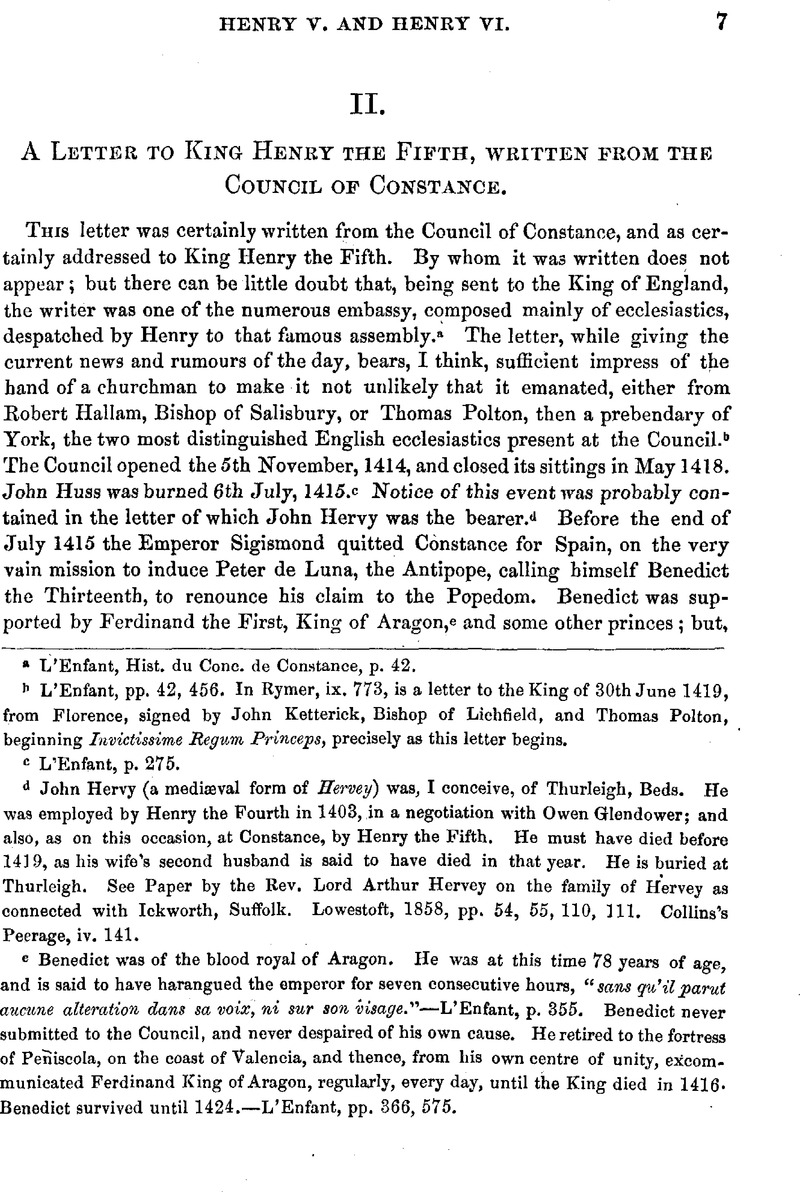No CrossRef data available.
Article contents
II. A Letter to King Henry the Fifth, written from the Council of Constance
Published online by Cambridge University Press: 23 February 2010
Abstract

- Type
- Letters during the Regins of Henry V. and Henry VI
- Information
- Copyright
- Copyright © Royal Historical Society 1863
References
page 7 note a L'Enfant, Hist, du Conc, de Constance, p. 42.
page 7 note b L'Enfant, , pp. 42, 456Google Scholar. In Rymer, ix. 773, is a letter to the King of 30th June 1419, from Florence, signed by John Ketterick, Bishop of Lichfield, and Thomas Polton, beginning Invictissime Regum, Princeps, precisely as this letter begins.
page 7 note c L'Enfant, , p. 275.Google Scholar
page 7 note d John Hervy (a mediæval form of Hervey) was, I conceive, of Thurleigh, Beds. He was employed by Henry the Fourth in 1403, in a negotiation with Owen Glendower; and also, as on this occasion, at Constance, by Henry the Fifth. He must have died before 1419, as his wife's second husband is said to have died in that year. He is buried at Thurleigh. See Paper by the Rev. Lord Arthur Hervey on the family of Hervey as connected with Ickworth, Suffolk. Lowestoft, 1858, pp. 54, 55, 110, 111. Collins's Peerage, iv. 141.
page 7 note e Benedict was of the blood royal of Aragon. He was at this time 78 years of age, and is said to have harangued the emperor for seven consecutive hours, “sans qu'il parut aucane alteration dans sa voix, ni sur son visage.”—L'Enfant, p. 355. Benedict never submitted to the Council, and never despaired of his own cause. He retired to the fortress of Peniscola, on the coast of Valencia, and thence, from his own centre of unity, excommunicated Ferdinand King of Aragon, regularly, every day, until the King died in 1416. Benedict survived until 1424.—L'Enfant, pp. 366, 575.
page 8 note a L'Enfant, , p. 361.Google Scholar
page 8 note b L'Enfant, , p. 312.Google Scholar
page 8 note c Sismondi (Rep. Ital. vi. 175,) says 10th August.
page 8 note d Sismondi, , vi. 175.Google Scholar
page 8 note e Ibid. p. 176. Sforza did not die until 1424, when he was drowned in the Pesoara. Sismondi has given a very graphic account of his death (Rep. Ital. vol. vi. p. 229).
page 8 note f L'Enfant, , 721.Google Scholar
page 8 note g Ibid. p. 350.
page 8 note h He arrived in London 24th November 1415.—Hunter's Tracts (Agincourt), p. 20.
page 8 note i L'Enfant, , p. 723Google Scholar. Pauli, Geschichte von England, v. 132. Hume takes no notice of the Emperor's visit.
page 8 note k English Chron. p. 43.




